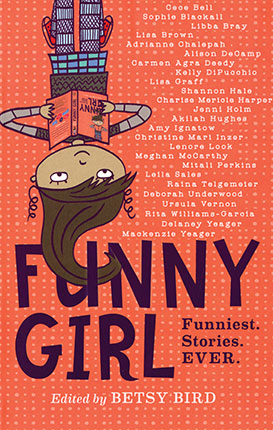Full Text Reviews: Booklist - 03/15/2017 In this testament to female funniness, librarian-book blogger Bird (Wild Things! Acts of Mischief in Children’s Literature, 2014) culls short stories, personal essays, and bite-size comics from a diverse array of creators, including celebrated author-illustrators (Raina Telgemeier), best-sellers (Kelly DiPucchio), stand-up comedians (Adrianne Chalepah), and TV writers (Delaney and Mackenzie Yeager). Designed to introduce youngsters to laugh-out-loud ladies, a historically underrepresented niche in kids’ lit, this anthology covers everything from race (Mitali Perkins’ “Brown Girl Pop Quiz: All of the Above”) and burning bathtubs (Carmen Agra Deedy’s “One Hot Mess”) to champion bird-calling (Rita Williams-Garcia and Michelle Garcia’s “Desdemona and Sparks Go All In”). While playful potential activities, including Mad Libs and Leila Sales’ “How to Play Imaginary Games,” keep things interactive, the collection’s tender tidbits of advice, particularly Libba Bray’s take on first periods, truly stand out. As these ladies prove, with positivity, pluck, and a dash of hindsight, you can find humor just about anywhere. Hilarious and heartfelt, this won’t only appeal to funny girls and boys, it’ll inspire them. - Copyright 2017 Booklist. School Library Journal - 06/01/2017 Gr 4–6—A collection of hilarious short stories, comics, letters, and quizzes, geared toward middle grade girls. A range of well-known authors contribute pieces (Amy Ignatow, Libba Bray, Raina Telgemeier, Ursula Vernon, and Shannon Hale) along with lesser-known writers. The pinkish cover, depicting a girl dangling upside down and reading Funny Girl, is appealing, as are the accessible font styles and comic illustrations throughout. Many of the stories describe bodily functions (farts, poo, pee, and periods all make appearances), proving boys don't have a monopoly on toilet humor. Though the majority of the humor is lighthearted and kid-appropriate, some jokes hit a sour note. In the first story, "How To Tell a Joke" by Delaney Yeager and Mackenzie Yeager, the narrator relates the tale of watching an antidrug assembly featuring a former drug addict with a prosthetic hand. She explains how she later imitated the man by putting her own hand inside her shirt and suggests that this is a good way to get laughs from classmates—a gag she comes back to several times in the chapter. Readers whose families have experienced addiction or who have physical disabilities are likely to find these jokes painful rather than chuckle-worthy. Authors and characters come from a range of backgrounds, including Cuban American, Native American, and Indian American. A short biography of each author can be found in the back matter. The stories work especially well when read consecutively, since several jokes recur, but most pieces stand alone. VERDICT With the exception of the first chapter's insensitivity, these stories are bound to engage most readers and tickle ribs.—Michelle Anderson, Tauranga City Libraries, New Zealand - Copyright 2017 Publishers Weekly, Library Journal and/or School Library Journal used with permission. Loading...
|



